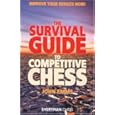I picked up The Survival Guide to Competitive Chess : Improve Your Results Now! by John Emms (2007) in the library and was pleasantly surprised. The book is a good overview of things that happen in practical chess tournament games, and an experienced player's view on them. This book won't teach you how to play rook endgames properly, but will explain why even chess grandmasters make the mistakes they make, and how to avoid them. I am of course a much weaker player than the author, but nearly every example Emms gives I could relate to. Here are two examples I could related to my own study of opening theory:
- As you learn a new opening, your initial results are not so good because you don't know any theory, then it gets better because you are have more knowledge, and still have the sense of freshness playing new positions. After you play a few dozen games with an opening, your results get worse, because you are bored with studying the opening, and less alert during games
- "Little knowledge" is an idea or variation that we saw somewhere, but don't remember the exact details. Instead that vague feeling of "this feels like a book move, but I am not 100% sure, but I'll play it anyway cause it probably is a book move". Ideas taken out of the exact context can do more harm than good and lead to superficial moves.
In some of Alburt's books or Dzindzhikhashvili's videos the authors seems to try to impress you with the fact that they are grandmasters, and thus they "know all about it" (is it their ego, or they just want to sell you more of their stuff??), but Emms is honest about why he made the mistakes, which is good because I found my hallucinations are sometimes similar. His advice on using computers seemed also quite reasonable. The book has a lot of prose and diagrams, so it is easy to read without a board.





No comments:
Post a Comment